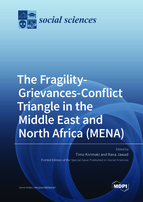The Fragility-Grievances-Conflict Triangle in the Middle East and North Africa (MENA)
A special issue of Social Sciences (ISSN 2076-0760).
Deadline for manuscript submissions: closed (30 September 2021) | Viewed by 47949
Special Issue Editors
2. Sejong Institute, Seongnam 06579, Republic of Korea
Interests: conflicts; conflict resolution; conflict escalation; war; peace research; military interventions; state fragility and its effect on conflict, organised violence
Special Issue Information
Dear colleagues,
This Special Issue looks at the conceptual, theoretical and causal/constitutive interaction between state fragility and conflict as well as between state fragility and lack of human development. It will focus on the MENA region, paying particular attention to the role of social policies and the political contexts that underpins them.
An introductory article of the Special Issue will show that state fragility in the MENA region predicts developmental grievances and violence as it does in the rest of the world. However, the MENA region is unique as its problems have become more internationalised and the region is intervened militarily by outsiders more than other regions. Conflict and developmental grievances in the MENA region are much more related to problems of political legitimacy than in the rest of the world. The impact of economic reliance on commodity and raw material trade is also much more complicated in the MENA region than in the rest of the world. This Special Issue will consist of articles focused on different aspects of these generic or MENA-specific factors in the fragility–grievance–conflict triangle.
The call for papers to this Special Issue aims at attracting theoretical and empirical studies that focus on the complex relationship between, on one hand, states’ institutional capacity and resources (including the felt social, economic and political injustices and lack of public services in the MENA) and, on the other, grievances and conflict. The aim is also to attract papers that focus on policies to remedy the social and political problems of the MENA region related to the triangle of fragility, grievance and conflict.
Prof. Dr. Timo Kivimaki
Dr. Rana Jawad
Guest Editors
Manuscript Submission Information
Manuscripts should be submitted online at www.mdpi.com by registering and logging in to this website. Once you are registered, click here to go to the submission form. Manuscripts can be submitted until the deadline. All submissions that pass pre-check are peer-reviewed. Accepted papers will be published continuously in the journal (as soon as accepted) and will be listed together on the special issue website. Research articles, review articles as well as short communications are invited. For planned papers, a title and short abstract (about 100 words) can be sent to the Editorial Office for announcement on this website.
Submitted manuscripts should not have been published previously, nor be under consideration for publication elsewhere (except conference proceedings papers). All manuscripts are thoroughly refereed through a double-blind peer-review process. A guide for authors and other relevant information for submission of manuscripts is available on the Instructions for Authors page. Social Sciences is an international peer-reviewed open access monthly journal published by MDPI.
Please visit the Instructions for Authors page before submitting a manuscript. The Article Processing Charge (APC) for publication in this open access journal is 1800 CHF (Swiss Francs). Submitted papers should be well formatted and use good English. Authors may use MDPI's English editing service prior to publication or during author revisions.
Keywords
- State fragility
- Conflict
- Human development
- Social protection
- Grievances
- State Fragility Index
- Human Development Index
- Battle Deaths
- Social policy
- Social justice






